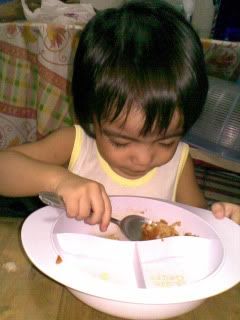Our little girl now eats table food and starts getting through a variety of foods. She even asserted how to self-feed independently. She likes to eat rice, fish and mangoes. I guess I'm lucky because she's not a picky eater like her two brothers. She eats anything we put on her plate and can able to finish it all. I need to be wary though, because she wanted to taste whatever we are eating. I sometimes feel that she eats more than she needed.
1.) Toddlers have little tummies, so serve foods that are packed with the nutrients they need to grow healthy and strong, and limit the sweets and empty calories.
2.) Milk is an important part of a toddler's diet because it provides calcium and vitamin D, which help build strong bones. Kids under age 2 should drink whole milk for the dietary fats needed for normal growth and brain development.
3.) It's important to watch out for iron deficiency after kids reaches 1 year of age. It can affect their physical, mental, and behavioral development, and also can lead to anemia. Increase iron-rich foods in your child's diet, like iron-fortified snacks, meat, poultry, fish, beans, and tofu.
4.) Avoid foods that could present choking hazards, like popcorn, hard candies, hot dogs, raw vegetables and hard fruits, whole grapes, raisins, and nuts. Supervise your child at all times when eating.
5.) Offer your child three meals and two or three snacks a day, but keep in mind that it's common for toddlers to skip meals. Allowing kids to skip a meal is a difficult concept for many parents, but kids should be allowed to respond to their own internal cues for hunger and fullness. Don't push food on a child who's not hungry, but kids shouldn't be allowed to eat on demand all day long either.
6.) Maintain a regular schedule of meals and snacks so your kids will come to expect that food will be available at certain times of the day.

2 comments:
awwwwww....that's a good sign....:) she's a cutie!
You are blessed with your daughter :)
Post a Comment